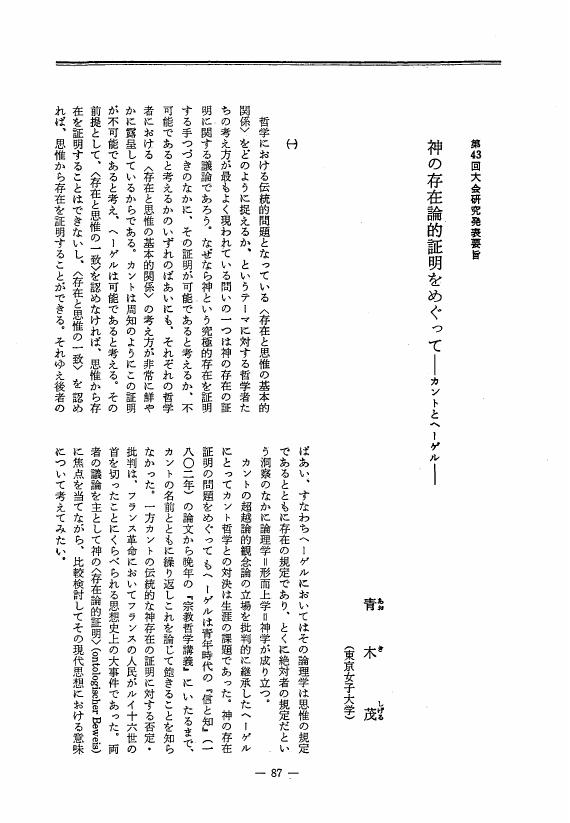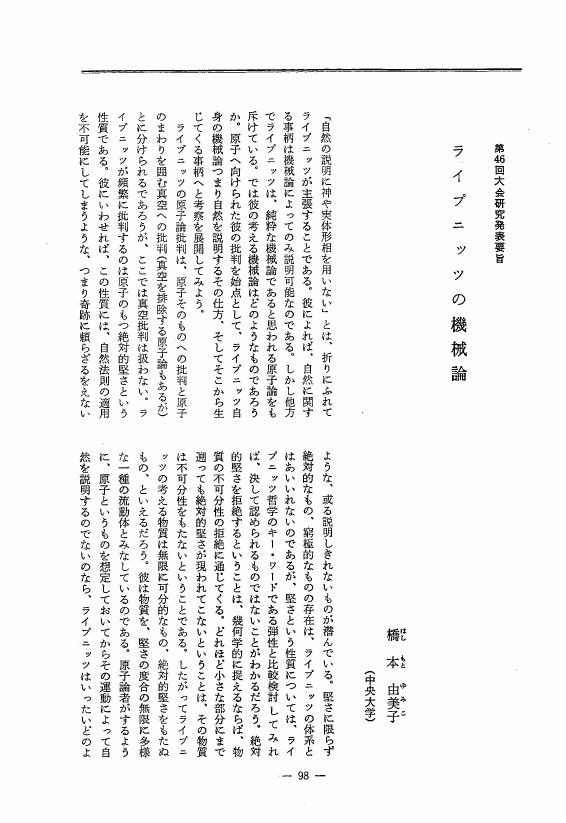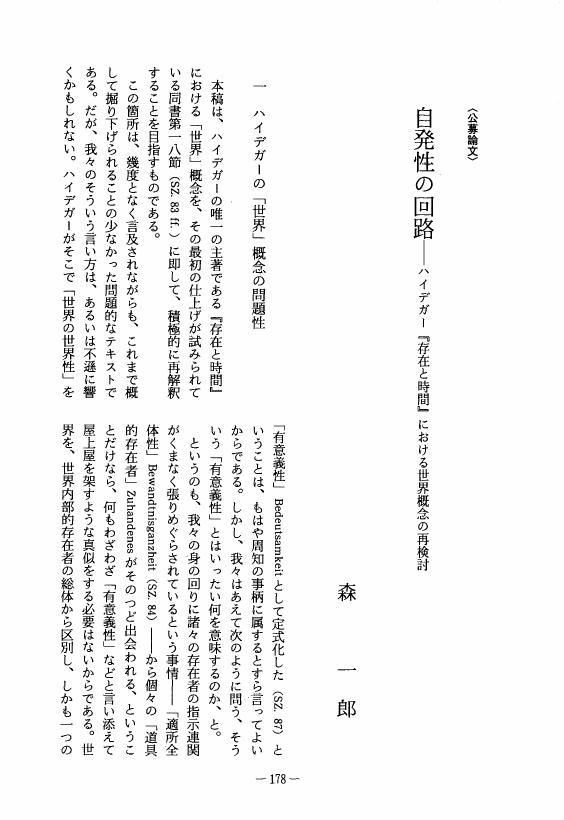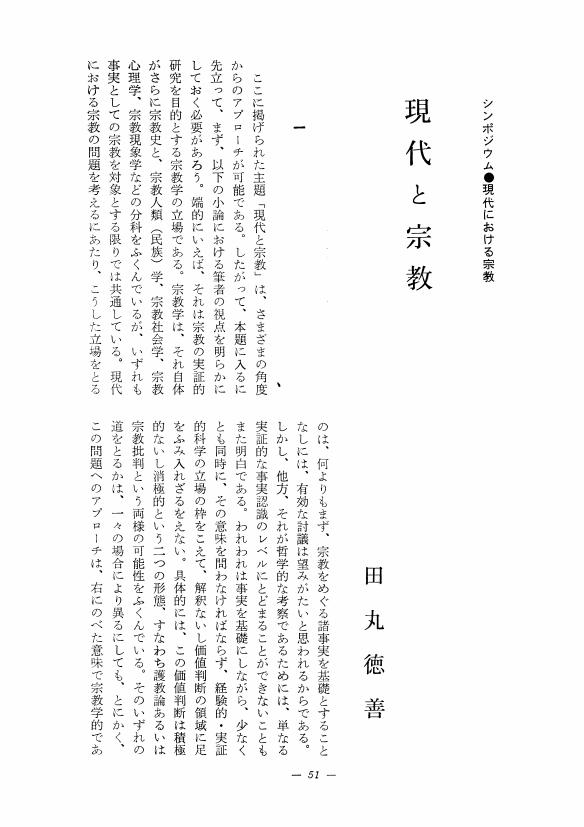1 0 0 0 OA クワインの「翻訳の不確定性」と「経験理論の決定不全性」について
- 著者
- 大石 敏広
- 出版者
- 日本哲学会
- 雑誌
- 哲学 (ISSN:03873358)
- 巻号頁・発行日
- vol.1996, no.47, pp.266-275, 1996-05-01 (Released:2009-07-23)
The thesis of the indeterminacy of translation is that manuals for translation can be set up in divergent ways, all compatible with the totality of speech dispositions, yet incompatible with one another. On the other hand the thesis of the underdetermination of empirical theory means that empirical theories can be at odds with each other and yet compatible with all possible data. According to Quine, there is a parallel between these two theses, but the parallel fails in certain respects. However, the reasons Quine gives for the parallel-failing are not valid, because they presuppose the problematical doctrine of physicalistic ontology. Although these reasons may be invalid, I still believe that the thesis of indeterminacy plays a singular role in justifying a refusal of the hypostatization of meaning. It is in this respect that the thesis of indeterminacy ultimately differs from the thesis of underdetermination.
1 0 0 0 OA 「同一物の永劫回帰」の源泉と律動性
- 著者
- 勝 道興
- 出版者
- 日本哲学会
- 雑誌
- 哲学 (ISSN:03873358)
- 巻号頁・発行日
- vol.2007, no.58, pp.147-162,22, 2007-04-01 (Released:2009-07-23)
Diese Abhandlung unternimmt Nietzsches Gedanke von der ewigen Wiederkehr des Gleichen zu prufen, vermittels der Unterscheidung seines Entstehungsprozesses in die drei Momente aufgrund der Geschichte von Zarathustra in Ecce homo.Erstens last der Werdenbegriff Heraklits sich zwar in der Philosophic im tragischen Zeitalter der Griechen abheben, aber es ist unmoglich, ein Quelle-moment fur die Wiederkunftslehre einem periodischen Kreislauf gemaß in semen Fragmenten abzulesen. So ist es vielmehr moglich, eine Vorausform fur die Wiederkunftslehre bei der kritischen Historie in Vom Nutzen und Nachtheil der Historic fur das Leben zu finden. Zweitens last das Beweisfuhrung-moment der Wiederkehr zwar in den Nachgelassenen Fragmenten von Friihjahr-Herbst 1881 hinter, aber an seiner erkenntnistheoretischen Grenze spielt es eine Rolle des Steuern nach dem Auswahl-moment in der Frohlichen Wissenschaft und Zarathustra. Das entscheidende Einverleiben mit Grauen und Gelachter im letzteren Buch zeigt einen Modus der Wiederkehr als rhythmische Bewegung. Durchs Bestrahlen aus der Untersuchung von der griechischen Rhythmik in Baslerzeit Nietztsches konnen wir entdecken, class er am Leitfaden des Leibes den Rhythmus fur Formel der Individuation oder Figuration des Werdens halt. Eine Szene von einem spielenden Kind am Meer in Zarathustra (quellend aus etwas Heraklitischem) gestaltet die Wiederkehr als selbe, das Gleiche wiederholende, rhythmische Wellenbewegung.
1 0 0 0 ミシェル・セールの〈混合体corps mêlés 〉概念
- 著者
- 縣 由衣子
- 出版者
- 日本哲学会
- 雑誌
- 哲学 (ISSN:03873358)
- 巻号頁・発行日
- vol.2016, no.67, pp.123-137, 2016
<p>Le but du présent article est de mettre en lumière la notion de ‹corps mêlés› introduite par Michel Serres dans <i>Les Cinq Sens</i> au moment de la description de la notion de peau. Il s'agit ici de situer la place et la portée de cette notion dans l'ensemble de la pensée philosophique de l'académicien français.</p><p>Les premiers ouvrages de Michel Serres, à savoir ceux des années 1960 jusqu'aux années 1980, l'ont fait connaître dans le domaine de l'épistémologie. En revanche, le fait qu'il ait entrepris dans le même temps l'analyse du concept de sensation est beaucoup moins connu, comme le prouve le nombre insuffisant d'études académiques consacrées à cette problématique, les liens reliant celle-ci avec les autres préoccupations de l'oeuvre de Michel Serres restant par conséquent ignorés.</p><p>L'intérêt du présent article se situe précisément dans la découverte de ces liens à travers l'analyse de la notion de ‹corps mêlés› dont Michel Serres se sert pour décrire la notion de peau. De cette façon, la peau apparaît comme le lieu des ‹corps mêlés› par lesquels le sujet et l'objet se mélangent. Mais que veut signifier Michel Serres en recourant à cette notion méconnue et a priori difficile d'accès ? Pour éclairer cela, nous nous concentrons ici sur la notion, primordiale dans l'oeuvre de Michel Serres, de ‹quasi-objet› notamment traitée dans <i>Le Parasite</i> et qui, en soulignant l'état potentiel du sujet, dépasse en définitive la dichotomie de la philosophie traditionnelle entre le sujet et l'objet.</p><p>Finalement, le présent article montre ainsi que le lieu des ‹corps mêlés› constitue l'état potentiel du sujet, mis en exergue par Michel Serres à travers la notion de ‹quasi-objet›, intervenant au niveau de la sensation.</p>
1 0 0 0 OA 模倣の存在論
- 著者
- 柴田 健志
- 出版者
- 日本哲学会
- 雑誌
- 哲学 (ISSN:03873358)
- 巻号頁・発行日
- vol.2014, no.65, pp.197-211_L14, 2014-04-01 (Released:2016-06-30)
- 参考文献数
- 11
Recent scientific breakthroughs in the study of imitation at multiple levels evoke further problems such as “Why should we imitate each other?” and “Why should we recognize another person as a model of ourselves?” which we can call ontological. Sartreʼs Being and Nothingness ought to be very helpful to an in-depth exploration of these. Although Sartreʼs book does not deal with imitation, it provides insights into important but overlooked aspects of this intriguing phenomenon. Following through with Sartreʼs arguments concerning being for-itself and being for-others in this book would offer a fundamental understanding of the imitative nature of human beings.In this paper, three explanations are presented, which are intended to illuminate the ontological aspects of imitation. First, the fact that our consciousness has the special feature of not being identical with itself (this is called for-itself), explains why we spontaneously imitate others. Second, the fact that being looked at by others can provide us with recognition of the dimension of ourselves as object (this dimension is called for-others), explains why we recognize others as models. Finally, that the gaze of others is a hole through which my world drains from my grasp, explains what aspect of the world we are focusing on in the act of imitating.I believe we can offer a firmer grounding for theoretical exploration of imitation than current experimental studies do in that we can provide arguments based on the specific features of consciousness, which are not available in these studies.
1 0 0 0 「沈黙」と「言語」:キルケゴールにおいて
- 著者
- 河上 正秀
- 出版者
- The Philosophical Association of Japan
- 雑誌
- 哲学 (ISSN:03873358)
- 巻号頁・発行日
- no.23, pp.97-110, 1973
1 0 0 0 OA 第43回大会研究発表要旨
- 出版者
- 日本哲学会
- 雑誌
- 哲学 (ISSN:03873358)
- 巻号頁・発行日
- vol.1984, no.34, pp.87-106, 1984-05-01 (Released:2009-07-23)
1 0 0 0 OA 黒積俊夫氏「カント解釈の問題」に対する質問要旨
- 著者
- 有福 孝岳
- 出版者
- 日本哲学会
- 雑誌
- 哲学 (ISSN:03873358)
- 巻号頁・発行日
- vol.1993, no.43, pp.93-99, 1993-04-01 (Released:2009-07-23)
1 0 0 0 言語は規則に支配されているのか
- 著者
- 大谷 弘
- 出版者
- 日本哲学会
- 雑誌
- 哲学 (ISSN:03873358)
- 巻号頁・発行日
- vol.2014, no.65, pp.135-150_L10, 2014
On the standard interpretation of the later Wittgenstein, it is supposed that he accepts the view that language is governed by rules. Many interpreters, explicitly or implicitly, think that Wittgenstein is committed to the view that the correct uses of words are determined by their rules.In my paper, I argue that the standard interpretation is incorrect as an interpretation of Wittgensteinʼs later thought on language and rules. First, in my view,Wittgensteinʼs position is that we explain the meaning of a word by rules, when it is necessary. However, when it is not necessary, we do not operate according to rules.Second, the standard interpretation ascribes to Wittgenstein a dogmatic philosophical method, which he in fact tries to avoid. On the standard interpretation, a rule for a word is supposed to be the source of normativity, so that, by citing the rules that Wittgenstein or Wittgensteinians identify, we can reject some philosophical assertions as nonsense. To think that only Wittgenstein or Wittgensteinians can identify the right rules in philosophical discussions is dogmatic, however, and by carefully surveying the text of Philosophical Investigations we can see that he avoids such dogmatism.In section 1 of my paper, I explain the standard interpretation. In section 2, I review the general points of Wittgensteinʼs discussion of rule-following and argue that the standard interpretation has a problem here. In section 3, I show that the Wittgensteinʼs texts cited by Glock, a prominent supporter of the standard interpretation, as the evidence for his interpretation do not support it. In section 4, by carefully investigating the remarks that concern rule-following in Philosophical Investigations, I argue that the standard interpretation misunderstands the method and aim of Wittgensteinʼs argument. Finally, in section 5, I argue that the standard interpretation has serious flaws as an interpretation of Wittgensteinʼs view of rules.
1 0 0 0 模倣の存在論:──サルトルの哲学を手がかりに
- 著者
- 柴田 健志
- 出版者
- 日本哲学会
- 雑誌
- 哲学 (ISSN:03873358)
- 巻号頁・発行日
- vol.2014, no.65, pp.197-211_L14, 2014
Recent scientific breakthroughs in the study of imitation at multiple levels evoke further problems such as "Why should we imitate each other?" and "Why should we recognize another person as a model of ourselves?" which we can call ontological. Sartreʼs Being and Nothingness ought to be very helpful to an in-depth exploration of these. Although Sartreʼs book does not deal with imitation, it provides insights into important but overlooked aspects of this intriguing phenomenon. Following through with Sartreʼs arguments concerning being for-itself and being for-others in this book would offer a fundamental understanding of the imitative nature of human beings.In this paper, three explanations are presented, which are intended to illuminate the ontological aspects of imitation. First, the fact that our consciousness has the special feature of not being identical with itself (this is called for-itself), explains why we spontaneously imitate others. Second, the fact that being looked at by others can provide us with recognition of the dimension of ourselves as object (this dimension is called for-others), explains why we recognize others as models. Finally, that the gaze of others is a hole through which my world drains from my grasp, explains what aspect of the world we are focusing on in the act of imitating.I believe we can offer a firmer grounding for theoretical exploration of imitation than current experimental studies do in that we can provide arguments based on the specific features of consciousness, which are not available in these studies.
1 0 0 0 問題概念としての意味
- 著者
- 藤田 晋吾
- 出版者
- The Philosophical Association of Japan
- 雑誌
- 哲学 (ISSN:03873358)
- 巻号頁・発行日
- no.23, pp.85-96, 1973
言語における語の〈意味〉、一般に記号の〈意味〉とは何かという問題は、種々の仕方で答えられようけれども、そもそも何故〈意味〉が問題となるのかということが予め了解されていないと、的はずれの議論をひき出すことにもなりかねない。しかし私には、今日の言語論の洪水のなかで、そもそも何故〈意味〉が問題なのかに関して、この予備了解が充分明確にとりつけられているようには思えない。<BR>〈意味〉が何故に問題概念なのか、私がそれに問題を感じるのは、つぎの点においてである。つまり、科学的諸概念が有しているところの意味が、科学理論によって説明さるべきものとして現われてこないで、かえって科学的認識の前提要件となっているように見えるということ、換言すれば、〈意味〉が所与たる性格をもった "現象" としてではなく、認識主観たる "私" の作用 (act) と不可分の相関関係にある何かとして、科学に対して先駆性をもち、それゆえ、科学がそれを説明しようとすれば、悪循環にひき込まれるかも知れぬという危惧をいだかせるものに見えるという点においてである。そして〈意味〉のこのような存在の仕方が、まさにそのゆえに、科学の不完全性を露見せしめるのではないかという点においてである。<BR>〈意味〉が哲学的問題として現われてくる場面は、むろん上述のような場合だけではないが、さし当ってこの小論ではその点に一つの問題があることを承認して貰えるような議論を、〈意味〉の心理学的定義を批判するという形で抉り出してみたい。そして、ここで〈意味〉の心理学的定義というのは、ラッセルの場合を指している。またそれの批判としてはヴィトゲンシュタインをとりあげる。<BR>予め粗略な論点提示を行なうなら、ほぼつぎのようになろう。もし〈意味〉が "心的" なものであるなら、そしてそれが "心的状態 " とか "心的現象" とかいう具合に規定しうるものであるなら、それは、心理学的・生理学的に特定される諸条件の結果たる、記述され描写さるべき対象としての"状態" ないし"現象"として説明されることになる。それゆえ上述の科学に対して先駆性を有するものとしての、科学の不完全性を示すものとしての〈意味〉の問題は、一向に落着しない。したがって私には、〈意味〉の心理学的定義は、〈意味〉がどうでもよい問題である場面で与えられているように思われる。<BR>そこで、ラッセルの場合を検討してみよう。
1 0 0 0 OA 第46回大会研究発表要旨
- 出版者
- 日本哲学会
- 雑誌
- 哲学 (ISSN:03873358)
- 巻号頁・発行日
- vol.1987, no.37, pp.98-117, 1987-05-01 (Released:2009-07-23)
- 著者
- 大庭 健
- 出版者
- The Philosophical Association of Japan
- 雑誌
- 哲学 (ISSN:03873358)
- 巻号頁・発行日
- no.47, pp.1-14, 1996
国家と民主主義を、あくまで哲学の立場で考えるという営みに、道徳哲学・倫理学の立場から参与せよ。これが私に課された役回りらしい、と今になってようやく気づいた私は、なんでも簡単に引き受けてしまう自分の浅はかさに改めて愕然としている。<BR>理由は、錯綜しているが、少なくとも二つはハッキリしている。ひとつ。右の課題の遂行は、政治学・政治哲学、法学・法哲学での議論を一応は理解したうえで、哲学固有の観点から問をたてることを要求する。しかし私は、それら諸領域での議論に通暁してもいないし、哲学固有の観点についても見解が定まっていない。もうひとつ。右のような生の問題について哲学・思想の名でなにかを語ろうとすると、ひとは (少なくとも私のような人間は) 、いつしか、あたかも管制高地から情況を俯瞰して正しい指令をくだせるかのように自任する「大文字の知識人」ふうの思考回路に誘いこまれる。<BR>しかし私としては、それは避けたい…… (だったら、なぜ引き受けたのだ!?) しかし、浅はかにも引き受けてしまった以上、国家と民主主義について何らかの問をたて、答を求める議論の一端を提示しなければならない。そのために、まず、見苦しいが床屋政談ふうに (つまり受け売りの横流しで) 話題を列挙し、次にそこから、どんな問題があぶり出されてきそうかを探ってみたい。
- 著者
- 稲岡 大志
- 出版者
- 日本哲学会
- 雑誌
- 哲学 (ISSN:03873358)
- 巻号頁・発行日
- no.61, pp.165-179, 2010-04
1 0 0 0 OA 自発性の回路
- 著者
- 森 一郎
- 出版者
- 日本哲学会
- 雑誌
- 哲学 (ISSN:03873358)
- 巻号頁・発行日
- vol.1993, no.43, pp.178-188, 1993-04-01 (Released:2009-07-23)
1 0 0 0 OA 生老病死と共に生きる
- 著者
- 浜渦 辰二
- 出版者
- 日本哲学会
- 雑誌
- 哲学 (ISSN:03873358)
- 巻号頁・発行日
- vol.2015, no.66, pp.45-61, 2015-04-01 (Released:2017-06-10)
The English word “Care” is translated by a myriad of Japanese words depending on context. In this paper I would like to ask what is the essence of “Care” and I shall attempt to argue that it is related to our living with others and with birth, ageing, illness and death.Birth, ageing, illness and death - these are Buddhist concepts for the four stages of suffering which human beings should trace in their lives. Rather than consider these directly, however, I want to discuss how the situation around these four types of suffering has changed in contemporary Japanese society, especially after the World War II and caused philosophical-ethical problems. Suffering in the original Buddhist ideas refered to the things that a human being cannot change at all, e.g. birth is a gift from the heaven and death is a calling from the heaven, whereas they are now medicalized and become what we are forced to decide to give birth or to die. Considering birth, ageing, illness and death in this new situation is my aim in the clinical philosophy of Care.Birth, ageing, illness and death seem on the surface to be the phenomena applying to an individual person. On closer examination, however, they are at each stage actually occurrences that take place between persons and in relation to others. Consequently we can interpret living with birth, ageing, illness and death as a relationship of “Care”.
1 0 0 0 OA イタリア哲学界の現況
- 著者
- 清水 純一
- 出版者
- 日本哲学会
- 雑誌
- 哲学 (ISSN:03873358)
- 巻号頁・発行日
- vol.1958, no.8, pp.70-76, 1958-03-31 (Released:2009-07-23)
今日のイタリアにおける哲学研究発達の有様を省みると、明治維新以後の我が国のそれと似通ったところがある.イタリアは、ルネサンス以来、諸外国勢力の干渉によって分裂をつづけてきたために、近代国家としては他のヨーロッパ列強に立遅れることとなった.イタリア国家の独立統一が事実上成立したのは、一八七〇年 (明治三年) のことなので、このおくれを取戻すためには、まず先進北欧諸国の文明文化を輸入することから始めなければならなかった.そしてイタリア哲学界に真先にはいってきたものが、当時の世界に君臨していたドイツ哲学であったことはいう迄もない.戦前のイタリアの代表的思想家といえば、ジェンティーレ (G.Gentile) とクローチェ (B. Croce) をあげるのが普通であるが、この二人もまたヘーゲル右派と左派とも呼ばれるように、ドイツ観念論の影響を多分にうけている.つまり戦前のイタリア哲学界の主流をしめていたものはドイツ観念論の研究であり、指導的学者もまたその研究家に多かったので、現代イタリアの哲学はドイツ哲学の輸入から出発したといっても過言ではない.また、戦前から戦中にかけては、周知のようなファッショ政権の国粋主義的傾向によって、ファシズムの理論的裏づけと同時にイタリア思想の研究が積極的に支援助長された.さらに戦後思想の発展についても、敗戦後の我が国の思想界が帝国主義への反省から出発したように、イタリアでもまたファシズムへの批判がその出発点となったところへ、マルクシズムや実存主義やプラグマティズムといった諸思想が洪水のように流れこみ溢れでて、諸観念の混沌時代を現出したのである.このように我が国とイタリアとの間には類似性があるけれども、イタリアの哲学がまた独自の足どりをもって前進したことはいうまでもない.まずその哲学を生み出しているイタリアの社会的地盤、その長い輝かしい歴史と伝統はイタリア民族の意識と思想を強固に規制している.古代ローマ文化の時性としてよく引合に出される現実的性格は、今日までイタリア民族の底を一貫して流れているものである.この現実的性格は目前に現われたものを貧欲に吸収しようとして多面的となる.たとえばいわゆるルネサンスの万能天才レオナルドのディレッタンティズムはその典型といえる.その点ではイタリアに輸入されたドイツ観念論が果してどれだけ血肉化したかは問題で、さまざまのイタリア的消化をせねばならなかったのであって、むしろおくれてはいってきたコントの実証主義の方がやすやすと受け入れられたという見方もされるのである.学者の研究活動も一般に多面的で、学究生活と社会生活の結びつきが密接なため、我が国のように専門化が徹底せず、いいかえれば哲学と市民生活或は社会実践との境界線はより複雑である.こうした性特はまた何よりもイタリアの歴史のうちに最もよくあらわれているので、自己の歴史伝統の尊重がイタリア哲学の特性ともなってくるのである.したがってイタリア思想史の研究は、ファシズム時代にぱっと燃えおちた花火線香のような一時的現象ではなく、戦後の今日も性格こそ異ってはいるものの依然として続けられ、しかもかえって隆盛になって今日のイタリア哲学研究の一特色とまでなりつつある現状である.上の如き一般的特性を背景に思い浮べながら、第一に時代思潮の流れからみたイタリア哲学界の現況及び傾向を素描し、第二にルネサンス哲学の研究状況を紹介することによってあわせてその特性の一半をうかがうよすがとしたい.
1 0 0 0 OA 質と量について
- 著者
- 高柳 茂
- 出版者
- 日本哲学会
- 雑誌
- 哲学 (ISSN:03873358)
- 巻号頁・発行日
- vol.1957, no.7, pp.55-61, 1957-03-31 (Released:2009-07-23)
- 参考文献数
- 27
近代的形式論理学の最近の著しい発展に刺戟されたことも一つの原因に数えられようが、唯物弁証法もその歴史的遺産を再検討し、自己の論理形式を一層発展させようとする気運が近頃高まって来たように思われる.唯物弁証法が「思惟及び現実の論理」としての力を喪わない為にも、諸科学の発展に応じた諸原則の展開が常に試みられてゆかねばならない.ところで近代的な弁証法は伝統的形式論理学の内容的空しさから脱却し、その無力を克服する為に、近代的形式論理学の方向とは異ってカテゴリーの論理的価値を重視し、その批判的考察を自らの論理的主題に大きく取り上げた点に一つの著しい論理的特性を持つと考えられよう.唯物弁証法も、このドイツ観念論特にヘーゲルが試みた課題の成果を批判しつつ、又幾多の点で基本的に継承しているが、所謂「量質転化の法則」も受け継がれた主要なものの一つである.この小論は「量質転化の法則」に対するサルトルの批判から出発し、苦干の問題点を取り出した上で二三の弁証法的思想家の見解に対比しつつ検討を加え、質と量のカテゴリーの多義牲に少しでも光を与えることを目的とする.
- 著者
- 北野 安寿子
- 出版者
- 日本哲学会
- 雑誌
- 哲学 (ISSN:03873358)
- 巻号頁・発行日
- vol.2008, no.59, pp.149-162,L15, 2008-04-01 (Released:2010-07-01)
- 参考文献数
- 23
In recent decades, one of the most widely debated questions in the philosophy of mind has been whether consciousness is physical or nonphysical. Jackson's knowledge argument, which argues that there are truths about consciousness that cannot be deduced from physical truths and infers that physicalism is false, has attracted interest since its appearance in 1982. In this paper, I examine the three major physicalist replies to the argument.I first clarify what the argument requires of physicalists: they must show that physicalism is as compatible as property dualism with the following two intuitions: (i) no amount of nonphenomenal knowledge suffices for phenomenal knowledge (empiricism about phenomenal knowledge), and (ii) the object of a piece of empirical knowledge is a fact. I next point out that there are two options a physicalist who accepts (i) and (ii) might take: (A) to refute the knowledge argument and nevertheless satisfy (i) and (ii); (B) to show that physicalism can accept the argument and satisfy (i) and (ii). In the final section, I examine the three major (A)-type responses to the argument: the Non-Propositional-Knowledge View; the Old-Fact/New-Mode View; and the Incomplete-Physical-Knowledge View.The conclusion I draw is this: the first reply fails to establish the invalidity of the argument; the second fails to satisfy intuition (ii); the third succeeds in satisfying both intuitions, but only in a negative way. It therefore appears that (B) is the more preferable option for a physicalist to adopt.
1 0 0 0 OA 現代と宗教
- 著者
- 田丸 徳善
- 出版者
- 日本哲学会
- 雑誌
- 哲学 (ISSN:03873358)
- 巻号頁・発行日
- vol.1973, no.23, pp.51-63, 1973-05-01 (Released:2009-07-23)
- 参考文献数
- 37
1 0 0 0 OA 第54回大会一般研究発表要旨
- 出版者
- 日本哲学会
- 雑誌
- 哲学 (ISSN:03873358)
- 巻号頁・発行日
- vol.1995, no.45, pp.101-172, 1995-04-01 (Released:2009-07-23)





